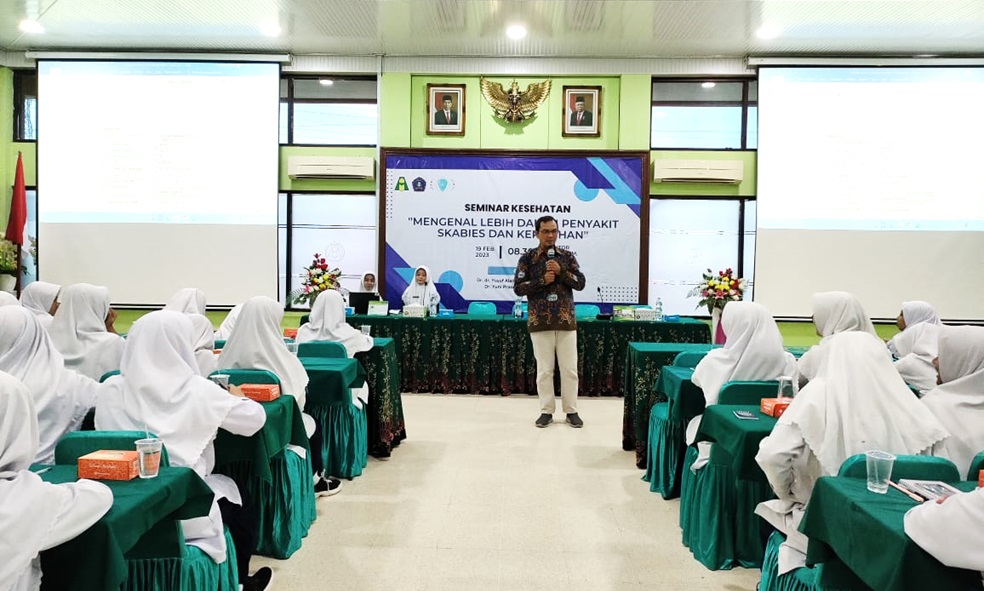Peningkatan Pengetahuan tentang Pengelolaan Scabies pada Santriwati Pondok Pesantren Modern Increased Knowledge about the Management of Scabies in Female Students of Modern Islamic Boarding School
Main Article Content
Abstract
Scabies is a skin disease caused by an infestation of the ectoparasite Sarcoptes scabiei var hominis, which creates tunnels that cause clinical manifestations of itching at night. Health promotion through health hygiene literacy for scabies prevention is essential in various literature. Education is the delivery of health information and an effort to increase motivation/enthusiasm, skills, and confidence in carrying out health actions related to scabies management. According to the author, this comprehensive solution, besides increasing the literacy of individual students and teachers, also increases sustainability in a more comprehensive management of scabies in the future. A total of 60 people, consisting of 56 female students and 4 ustadzah, voluntarily participated in this activity to completion. An indicator of the effectiveness of implementing this activity is improving management knowledge as measured by the participants' pre vs post-test scores. There is a significant average increase in knowledge of scabies management. If we look at the proportion of participants who experienced an increase in their knowledge of scabies management, it was found that 95 percent of the participants had an increase in their knowledge, indicating the effectiveness and sustainability of this educational program. Education that aims to increase knowledge of scabies management as a whole runs effectively and shows the sustainability of this program in the future. These results are expected to increase independence in managing scabies effectively in modern Islamic boarding schools.
Downloads
Article Details

This work is licensed under a Creative Commons Attribution-ShareAlike 4.0 International License.
Authors who publish with this journal agree to the following terms:
- Any article on the copyright is retained by the author(s).
- Author grant the journal, right of first publication with the work simultaneously licensed under a Creative Commons Attribution License that allows others to share work with acknowledgment of the work authors and initial publications in this journal.
- Authors are able to enter into a separate, additional contractual arrangements for non-exclusive distribution of published articles of work (eg, post-institutional repository) or publish it in a book, with acknowledgment of its initial publication in this journal.
- Authors are permitted and encouraged to post their work online (e.g., in institutional repositories or on their websites) prior to and during the submission process, as can lead to productive exchanges, as well as earlier and greater citation of published work.
- The article and any associated published material is distributed under the Creative Commons Attribution-ShareAlike 4.0 International License
References
Akhror, T., Farrukh, A., Nurmamat, N., Nodir, O., Fazliddin, N., Muzaffar, C., et al. 2022. Scabies and the Impact of Scabies on Human Life. J Pharmaceutical Negative Results, 13(6): 3388–92. https://doi.org/10.47750/pnr.2022.13.S06.453
Aždajić, M.D., Bešlić, I., Gašić, A., Ferara, N., Pedić, L., Lugović-Mihić, L. 2022. Increased Scabies Incidence at the Beginning of the 21st Century: What Do Reports from Europe and the World Show. Life, 12(10), 1598, 1-15. https://doi.org/10.3390/life12101598
Badr, A., Taufik, A., Ghaith, F.A.A. 2022. Knowledge About Scabies Among Students at High Institute Of Health Science - Hajjah Branch (YEMEN). Enhanced Knowledge in Sciences and Technology, 2(2): 412–21. https://doi.org/10.30880/ekst.2022.02.02.044
Badwi, E.A., Yousuf, S.A. 2022. Prevalence of scabies cases in two public hospitals Aden/Yemen. Electronic Journal of University of Aden for Basic and Applied Sciences, 3(4): 304–12. https://doi.org/10.47372/ejua-ba.2022.4.200
Balcha F, Bizuneh H, Hunduma F. 2022. Scabies Outbreak Investigation and Its Risk Factors in Gumbichu District, East Shewa Zone, Central Ethiopia: Unmatched Case-Control Study. Research Square, 2(1): 2-20. https://doi.org/10.21203/rs.3.rs-1539780/v1
Estri, S.A.T.S., Khotibudin, M. 2022. Incidence and Management of Scabies in Boarding School: Perception from Residents. Indonesian Jurnal Nursing Practices, 6(1): 18–27. https://doi.org/10.18196/ijnp.v6i1.13355
Gomes, N., Guedes, P.M., Norton, P., Azevedo, F., Lisboa, C. 2020. Two scabies outbreaks at a tertiary care hospital in portugal. Acta Med Port, 33(12): 803–10. https://doi.org/10.20344/amp.12840
Jira, S.C., Matlhaba, K.L., Mphuthi, D.D. 2023. Evaluating the current management approach of scabies at selected primary health care in the Deder district, Ethiopia. Heliyon, 9(1): 1-11. https://doi.org/10.1016/j.heliyon.2023.e12970
Luwito, J., Lestari, D.I., Yulius, C.P., Liviansyah, M.P. 2022. Management of Scabies Cases with Secondary Infection in Children through Family Medicine Approach. Science Midwifery, 10(5): 4007–13. https://doi.org/10.35335/midwifery.v10i5.933
Niode, N.J., Adji, A., Gazpers, S., Kandou, R.T., Pandaleke, H., Trisnowati, D.M., et al. 2022. Crusted Scabies, a Neglected Tropical Disease: Case Series and Literature Review. Infectious Disease Report, 14(3): 479–91. https://doi.org/10.3390/idr14030051
Nurapandi, A., Kusumawaty, J,. Kusmiawatidi, N., Rosmiati, R,. Rahayu, Y., Lismayanti, L., et al. 2022. The Influence of Environmental Management and Personal Health Education on the Incidence of Scabies at Boarding School. KnE Life Science, 12–21. https://doi.org/10.18502/kls.v7i2.10281
